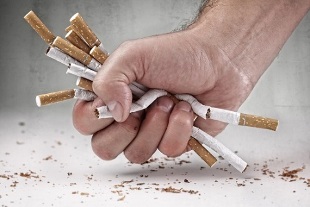The story of quitting smoking goes unnoticed. There are many reasons for this. This is of course a well-known physical and mental dependence and the ability of nicotine to actively participate in the metabolic processes of the human body. Let’s try to understand in detail what happens when you quit smoking, but you should not think that the purpose is to intimidate smokers who, after reading, will be afraid to quit smoking. All the benefits of quitting smoking will definitely be listed. Everything will be aimed just to make tobacco enthusiasts at least just think about quitting smoking?

As a result of quitting smoking
It is well known that cessation of nicotine intake into the body causes temporary metabolic disorders, which in humans are very often accompanied by feelings of hunger. Naturally, its shock suppressant causes the appearance of excess weight.
It has long been known that quitting smoking can lead to withdrawal. This is because nicotine has a weak narcotic effect and, like other drugs, addiction, and withdrawal causes withdrawal, which is expressed as follows:
- anxiety and irritability;
- nasal congestion and runny nose;
- increased sweating;
- loya;
- headache.
Of course, these are just common symptoms. Their presence may be associated, for example, with some type of disease, and the fact that this occurs when a person stops smoking is simply evidence of strong tobacco dependence on the patient.
Nicotine is a form of doping for the body, if you quit smoking, there may be consequences in the form of a weakened immune system, which is associated with temporary depression of the nervous system due to lack of nicotine stimulation.
After some time (on average two to three weeks) after quitting smoking, tuberculosis (sometimes painful) appears quite often. What happens to your lungs when you quit smoking? Lack of regular intake of nicotine and tar with cigarette smoke leads to the fact that the lungs begin to gradually clear it, and this requires the appearance of such a cough.
It is very rare, but there is still the development of stomatitis. This usually happens for the first time after a person stops smoking. It manifests itself in the form of boils on the oral mucosa.
Mental changes after quitting smoking occur in almost 100% of cases. What happens when you quit smoking, with our souls? There are many things here:
- decreased communication with a smoking partner may be accompanied by feelings of abandonment (periodic visits to the smoking room with them occur with discussion of many different problems, without one starting to feel lonely);
- changing common rituals (for example, after a meal, a cup of coffee or a glass of beer) causes discomfort;
- any depressed state begins to release energy and determination faster than when a person is addicted to cigarettes, tobacco somehow helps calm the nerves faster;
- in the process of withdrawal from nicotine becomes more difficult for a person to concentrate;
- decreased self-confidence is the most common consequence of quitting smoking, which is actually just a human delusion, because the lack of cigarettes causes panic, non-smokers do not have such feelings.
This is not a complete list of what happens to a person when they quit smoking. A large number of these effects arise when the supply of nicotine to the body suddenly stops. In this case, many are asking, is it not dangerous to quit smoking suddenly? All of this can convince smokers to quit smoking. It is wrong not to tell about the other side of the coin, after which it is possible to think about whether to quit smoking.
Advantages of quitting smoking
The goal is to not convince someone of something, it is just a call to think about whether to quit smoking.The biggest benefit of stopping is:
- cessation of exposure to tobacco toxins;
- no expenses for cigarettes;
- puts an end to the harmful effects of cigarette smoke on your loved ones;
- enhances appetite function, ability to enjoy a variety of flavors of your favorite dishes;
- freedom from addiction, ending nicotine addiction;
- improves skin condition, slows down aging;
- add free time that can be used productively;
- improved sense of smell, ability to sense smell more subtle;
- the ability to play sports completely, most importantly, more effectively;
- improves memory.
Some positive aspects of quitting nicotine may seem small, but for sure it will help at least to figure out whether to quit smoking altogether. And this has chosen the right path. There will always be more good things in getting rid of bad habits, because it gives health and freedom. These are probably the two most valuable things in human life. And you don't have to be afraid of what happens when you quit smoking. One is quite capable of overcoming all of this, and most of the psychological consequences of quitting smoking are only created by the person himself.
Is it dangerous to quit smoking suddenly
Many smokers ask themselves: "Is it dangerous to quit smoking suddenly? " There is an opinion that it is more dangerous for the human body. Meanwhile, most experts argue that you should only quit smoking once and nothing else. And if negative consequences arise, then it is unlikely that it is due to a sharp refusal to smoke, most likely these are just signs of body cleansing that has already begun. However, it must be acknowledged that if the smoker finally achieves the goal, gradually reducing the number of cigarettes, then this is acceptable. Answering the question: "Is it worth it to quit smoking suddenly or gradually? ", One can say with certainty only one thing - you need to quit, but how - it does not matter, the main thing is success.























